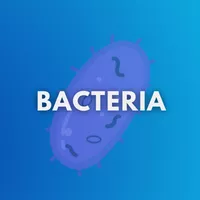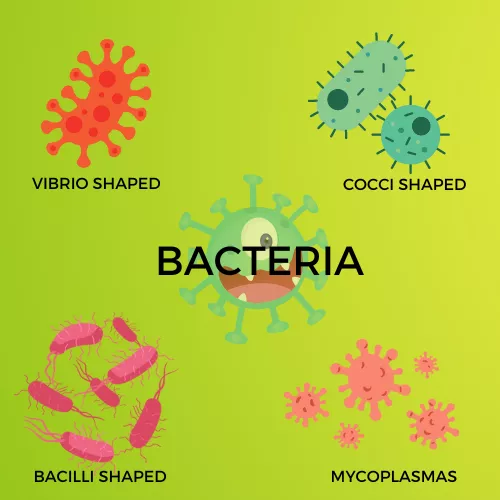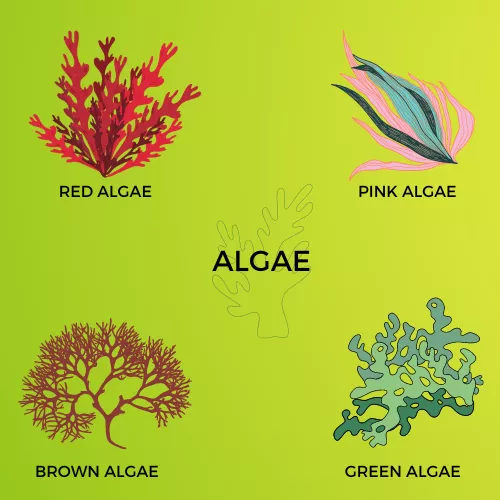Key difference: Both these words come under the same organisms and have the same characteristics, which are nothing but, Bacteria and Algae. Both of these microorganisms will help in improving ecosystems. Both can reproduce by asexual methods; there is no involvement of sexual methods. Bacteria size is bigger than algae size. Algae can grow more feet long, but bacteria can multiply many times but can’t grow.
Bacteria have two types, one is Gram-positive, and the other one is Gram-negative. The major difference in both types is gram-negative bacteria have an outer membrane in their body. The world’s first bacteria are cyanobacteria. Bacteria is the smallest living organism on this planet. The main characteristic of bacteria is it doesn’t have membrane-bound organelles in its body.
Algae have two types, harmful algae and harmless algae. Harmful algae produce toxins in our human body and also in animals. Chlorine is the best chemical to kill algae easily and immediately. Harmless algae are good for health. Examples of products are Chlorella and Spirulina, powder-form supplements that can be added to foods.
Good Examples of the words Bacteria and Algae are,
1. Bacteria do not have a nucleus.
2. Algae is made up of carbon, nitrogen and phosphorus.
BACTERIA

Bacteria are prokaryotic organisms.
Bacteria are microscopic, single-celled organisms with no nucleus and no organelles. Some bacteria are harmful and produce toxins; harmful chemicals affect them, and some are harmless. It is a prokaryotic and single cell’s organism. Humans have long used bacteria to create food products such as cheese, yoghurt, and pickles. Most of the bacteria are fast-growing and are first called animalcules.
The Best Example of Bacteria is “Bacteria lives in pH neutral.”
How do We Spell the Word Bacteria?
The vocal representation of the word Bacteria is “bak·teeuh·ree·uh,“ and in the below, you can know by hearing the audio of the phrase bacteria.
Enunciation:
Syllabification is where we split the words into individual vowel sounds. A syllable should have at least one vowel in the word. For example, we will see the syllable of the word “Bacteria.”
- I wondered if the word “Bacteria” has four syllables.
- The split is “BAC-TE-RI-A.”
Using “Bacteria” in sentences:
- Bacteria are disease-causing microorganisms.
- We need to wash our hands using soap to kill bacteria.
- Leeuwenhoek is the father of bacteria.
- How are the bacteria spreading?
- The size of the bacteria is 0.4–3 µm3.
ALGAE

Algae are eukaryotic organisms.
Algae is the primary producer and fixes carbon dioxide. Volvox, Spirogyra, Ulothrix, and Fucus are a few examples of algae. It is both microscopic and macroscopic. It has thallus in its body. Furthermore, it is mostly present in water bodies and snow and ice. Algae is most beneficial to use. It gets energy from sunlight. Most of the algae are free-floating in the water. It has different combinations of pigments like chlorophyll.
The Best Example of the word algae is, “Algae consists of a ring of DNA.”
How do We Spell the Word Algae?
Spell / Pronunciation in which a word or particular language is spoken among people. The Oral representation of the phrase Algae is “al·gee.” It would help if you practised it slowly for the outcome of a perfect spell. Below, you can know by hearing the audio of the word algae.
Enunciation:
Syllabification is where we split the words into individual vowel sounds. A syllable should have at least one vowel in the word. For example, we will see the syllable of the word “Algae.”
- Wondering if the word “Algae” has two syllables in it.
- The split is “AL-GAE”
Using “Algae” in sentences:
- There are algae on the ground.
- Many types of algae are present in this world.
- Algae has the power to regrow in the same place.
- The most popular algae are red and blue-green algae.
- What is the pronunciation of the algae?
Similarities between Bacteria & Algae
The title reveals the difference between Bacteria & Algae. But, like, you want to know also similar things about the above two words. So come, let’s see below.
- Both are unicellular organisms and are used in biotechnology.
- Both Bacteria and Algae are photosynthesized, and it will cause diseases.
Compare: BACTERIA & ALGAE
| BACTERIA | ALGAE | |
|---|---|---|
| DEFINITION | It is the large group of microorganisms which is a unicellular one. | It is the aquatic photosynthetic, nuclear bear organisms, which is Eukaryotic. |
| SYNONYMS | Microorganisms, Bacilli, Bugs, Pathogens. | Seaweed, dulse, kelp, Scum. |
| TYPES | Coccus form – Spherical-shaped Bacillus form – Rod-shaped Spirilla form – Spiral-shaped Vibrio form – Comma-shaped | Fire algae Green algae Red algae Brown algae Yellow-green algae |
| NUCLEUS | Nucleus absent | Nucleus present |
| REPRODUCTION | Bacteria reproduce through binary fission. | Algae reproduce through asexual reproduction. |
| EXAMPLES | Bacteria are microscopic organisms. Bacteria eat starches and sugars. E. coli is the main type of bacteria in food. The other name of bacteria is animalcules. Bacteria have flagellum to move its body. | What is the main effect of algae? Blue-green algae are so toxic. Plants and Algae have plastids. Algae is in 3 forms, Spot, Slime, and hair algae. Algae spores are present everywhere. |
Infographic Representation:


Resources & References:
Resources: Cambridge Dictionary (Bacteria & Algae), Merriam-Webster (Bacteria & Algae), Dictionary.com (Bacteria & Algae)
Reference: Dictionary.Cambridge.org[1], Merriam-Webster. com[2][3], Dictionary. com[4].
